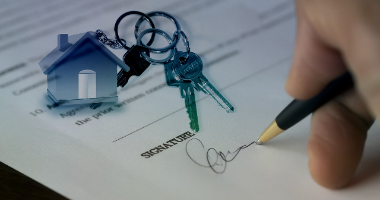REFINANCE

REFINANCE LOAN PROGRAMS
Refinancing Your Home Mortgage
Refinancing a home mortgage can be a big decision for many homeowners. Your situation and needs change over time so why shouldn’t your mortgage? Now might be the right time for you to refinance into a lower rate mortgage. You should take the time to consider the following questions to see if refinancing makes sense for you.
- Are you tired of your adjustable-rate that never seems to stop adjusting?
- Is Private Mortgage Insurance (PMI) getting you down when it doesn’t need to?
- Has the time come to save more money every month?
- Are mortgage rates currently lower than what your rate is?
- Will other financial opportunities present themselves as you refinance?
Refinancing is an easy way to solve many of your mortgage worries. Getting a lower monthly rate and paying less over the life of your loan just makes sense. At Castle Home Loans we’re ready to find the right refinancing solution for you. Our staff of refinance experts will help you evaluate your mortgage needs and draft a refinancing plan that will save you money.
Be sure to check out our mortgage refinance center to get the information you need so you can make a sound decision for you and your family.
Common Questions
What is Refinancing?
Refinancing is simply getting one loan to pay off another.
What does refinancing cost?
Typically, the closing cost of a refinance is between 1% & 2% of the loan amount, lender fees included. You may choose to pay points (see below) to lower your interest rate, or you could want to do a Low- or No-cost refinance. Contact us if you have any questions or would like to know more.
What are points?
Points (or discount points) are a way of lowering your interest rate. By paying 1% of the total loan amount up-front, a borrower can lower his interest rate by about 1/8%.
How does the APR differ from the interest rate?
The rate refers to what percentage of your loan you will pay in interest per month, whereas the annual percentage rate (APR) is an adjusted percentage that expresses the yearly cost and also includes certain charges and fees.
What are FRM & ARM?
The interest rate of a Fixed-rate Mortgage (FRM) will not change for the life of the loan. Alternatively, an Adjustable-rate Mortgage (ARM) will be subject to periodical interest rate adjustments based on interest rates around the country.
Should I modify my loan or apply for a refinance?
It depends. When you refinance, you may be able to get lower interest rates, but there are additional costs. On the other hand, a loan modification usually means extending the term of the loan and increasing the interest rate, but adding no other fees. Use our free mortgage calculator to compare what each might cost.
What’s the 2% rule? Is it useful?
The 2% rule states that you should aim for a 2% lower interest rate in order to ensure that the savings generated by your new loan will off-set the cost of refinancing, provided you’ve lived in your home for 2 years and plan to stay for at least 2 more.
While this rule is useful as a point of reference, it shouldn’t be adhered to strictly. If you think you will stay in your home for 5 or more years, for example even a 1% interest rate reduction will pay off for you. Additionally, with low- and no-cost refinancing options available, the cost of refinancing can be recovered much more quickly. Talk with us if you’d like to know more.
What is PMI?
PMI stands for Private Mortgage Insurance. Borrowers with less than a 20 percent down payment are required to carry this insurance as a means of protecting the lender against default.
Will I need to get an appraisal when I refinance?
Yes.
Does bad credit exclude me from a refinance loan?
Not exactly. When considering a refinance loan it’s important to remember that the better your credit score the better interest rate you can get. So if you don’t have perfect credit you can still qualify for a refinance loan but you’ll want to make sure that you’re lowering the interest rate on your loan enough to make a refinance worth it.
Do I need to have equity in my home to refinance?
Yes. The general rule is that you need to have 90% loan-to-value ratio before you can refinance. This means that your home is worth about 10% more than the loan that is current on the house. Additionally, your home will need to have increased in value since you purchased it.
Can I get cash from a refinance loan?
Yes. Depending on the type of refinance loan you opt for you can take out cash to use for bills, home repairs or whatever you might need it for. This option however should be carefully discussed with us. Please contact us today if you’re interested in this type of refinance loan.
Can I “lock-in” an interest rate on a refinance loan?
Yes. Now is the time to refinance because interest rates are so low. You can “lock-in” your rate today by contacting us or applying.
How long does it take to go through the refinance process?
A typically refinance usually takes between 2 and 4 weeks. Getting your home appraised is usually where most hang-ups occur so if you can schedule a home appraisal right away than getting a refinance loan is usually very quick.
How Can I Benefit from a Refinance?
There are many refinancing options available, and the benefits of each are unique. Whether you’re looking to reduce your payments or consolidate your debt, we can help. Call or come in today to get your process moving.
Lowering your monthly payment
- There are a few ways to lower your monthly payment, including obtaining a lower interest rate or extending the term of your loan. This is usually the primary reason for obtaining a refinance loan. Whether you’re looking to switch from a variable rate to a fixed rate loan or looking to pay less per month a refinance loan can help provide more stability and smaller payments.
Cashing-out equity
- Many people would like to take advantage of the equity they have built up in their homes. When refinancing, it is possible to accomplish that while still reducing your monthly payments. Accessing the equity in your home is a great way to make some improvements in your life whether that be paying for college, renovating or remodeling your home or even starting a business. For most people their homes are their greatest sources of wealth, so using that to its full advantage can make a big difference.
Consolidating debt
- Refinancing can be useful in keeping your debt manageable by replacing a number of high-interest loans (such as credit card debt) with a single, lower-interest loan. You can take the cash that you gain from taping the equity in your house and paying off any kind of debt that you might have. Most people will try to pay off high-interest, non-deductible forms of debt such as credit cards or auto loans.
Dropping Private Mortgage Insurance
- Depending on how much equity you have in your home you can refinance your home loan and possibly drop your private mortgage insurance. This can mean a lower overall monthly payment on your mortgage. If you think this might be the case please call us today at 408-859-3306.
Other refinancing options
- Points – By paying points up-front, you can reduce your interest rate. This may or may not be a good option for you. Those who see benefits from paying points up-front are those who plan on being in their homes for a while. A lower interest rate means a lower monthly payment. The longer you pay the lower monthly payment the more sense it makes to pay points up front.
Low-cost Refinancing
- This option can eliminate some or all of the fees associated with refinancing, but also carries a higher interest rate than a standard refinance. It’s important to take all aspects of a new loan into consideration before refinancing. Our refinance professionals are ready to help you make the right decision. Let us help you determine of low-cost refinancing is a good fit for you.
What Do I Need to Get Started?
When you refinance, certain documents and information will help the process move forward more quickly. Below are listed some of the more common
documents needed to refinance. The more information you have on-hand, the faster your refinancing will go.
You are likely to need Employment Information
- Most recent month’s pay stubs (originals)
- W-2 forms—past 2 years’ (copies)
- Income tax return information, especially if self-employed—past 2 years’ (copies)
Assets & Obligations Information
- Checking, savings, or stock accounts; 401K information; etc. (copies)
- Current credit score and reports
- Debt data such as credit card or current mortgage information
Insurance Information
- Homeowners insurance (copy, especially of the declarations page)
- Proof of title insurance



